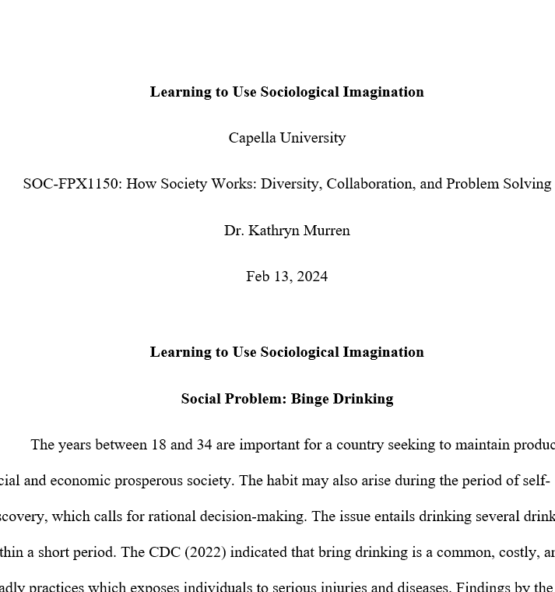


Learning to Use Sociological Imagination
Capella University
SOC-FPX1150: How Society Works: Diversity, Collaboration, and Problem Solving
Dr. Kathryn Murren
Feb 13, 2024
Availability:In Stock
Learning to Use Sociological Imagination
The years between 18 and 34 are important for a country seeking to maintain productive, social and economic prosperous society. The habit may also arise during the period of self-discovery, which calls for rational decision-making. The issue entails drinking several drinks within a short period. The CDC (2022) indicated that bring drinking is a common, costly, and a deadly practices which exposes individuals to serious injuries and diseases. Findings by the agency also showed that one in four American adults consume at least eight drinks during a binge session. The most vulnerable groups are low-income earners and those with lower levels of education.
Binge drinking is an individual personal problem because it portrays bad decisions that expose people to adverse health outcomes. Victims are vulnerable to alcohol poisoning, motor vehicle accidents, suicidal intentions, and violence. Binge drinkers also expose themselves to sexual transmitted diseases, unintended pregnancies, and chronic conditions such as high blood pressure, heart complications, and cirrhosis (Gloppen et al., 2022). Alterations in social and economic well-being highlight the need for individuals to make informed choices that safeguard them from chronic alcohol misuse. The harmful effects remind individuals to understand facts, including the standard drink that reduce the risk of short and long-term social, economic, and health challenges.
The social imagination theory reinforces understanding of the habit based on individual characteristics and historical aspects of the problem. The concept associates binge drinking with low self-esteem, anxiety, impulsivity, and frustration (Tholen et al., 2020). Other personal elements include underachievement and dependence, which are troubles that cause mental health issues, family conflicts, and other challenges. The social imagination theory also addresses social reforms and economic changes that expose individuals to binge drinking (Tholen et al., 2020). For instance, unemployment, social inequality, weak communal relations, and social exclusion perpetuate and influence many people to engage in binge drinking. Thus, social imagination could help various stakeholders to identify viable and sustainable solutions by clarifying how individuals interact with their environment.
Binge drinking reminds healthcare professionals, community health organizations, and other groups to understand severity of the issue and implications on society. The CDC (2022) indicated that binge drinking accounts for about 77% of the costs associated with lost productivity, healthcare expenditure, incarcerations, and other adverse outcomes. In this case, stakeholders collaborate to initiate a community preventive program with evidence-based interventions to reduce binge drinking and related harms (Krieger et al., 2018).
Peter Wareng
Got the SOCC-FPX1150 however it did not have all i had requested. Can i request a rewrite?